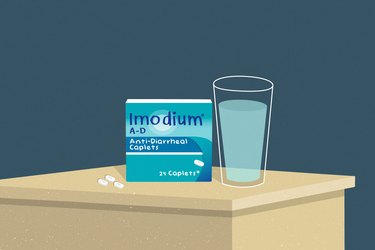
When you get hit with a bout of diarrhea, you might turn to an over-the-counter medication like Imodium to get the issue under control and feel better fast.
But what if you're plagued by diarrhea more often than not — in that case, can you take Imodium every day?
Video of the Day
Video of the Day
Here, learn whether it's harmful to take Imodium every day, the side effects of long-term use of Imodium and alternative diarrhea treatment options.
First, What's in Imodium?
Imodium is an over-the-counter medication used to control acute cases of diarrhea. The generic name of the medicine is called loperamide, and it works by reducing muscle contractions in the gut to decrease your bowel movements.
"It basically slows everything down in the gut, which is how it reduces diarrhea," says Supriya Rao, MD, a gastroenterologist with Tufts Medicine Lowell General Hospital in Massachusetts.
Imodium isn't the only medication that contains loperamide, though. The ingredient is used in other anti-diarrheal medications, including the following, per the National Library of Medicine:
- Imotil
- K-Pek II
- Kao-Paverin
- Kaopectate 1-D
- Maalox Anti-Diarrheal
- Pepto Diarrhea Control
How Often Should You Take Imodium?
For short-term diarrhea, it's recommended to take 4 mg (2 capsules) of Imodium after your first loose bowel movement, then 2 mg (1 capsule) after each subsequent loose bowel movement. But you shouldn't take more than 16 mg (8 capsules) in a day, says the Mayo Clinic. Avoid taking more than listed on the label.
Long-Term Risks of Taking Imodium
Imodium and other medications containing loperamide are fine to take for short periods, like if you have a stomach bug. But they're not meant to be taken to control chronic diarrhea.
1. It Could Cover Up a Bigger Problem
"If you're having multiple bowel movements for more than three or four days, there could be an underlying problem that needs to be addressed," Dr. Rao says. "Taking Imodium is just putting a bandage on the situation."
(That's also true if you're frequently relying on other GI meds like Pepto-Bismol.)
In some cases, frequent diarrhea or loose stools could actually stem from irritable bowel syndrome (IBS), a serious GI infection or inflammatory bowel diseases like ulcerative colitis (UC) or Crohn's disease.
In that case, you'd need to speak with your doctor about diagnosis and treatment options.
2. Your Risk for Side Effects Goes Up
As with any type of medication, your risk for having side effects is higher if you take the drug more often than recommended.
Loperamide can cause the following, per the Mayo Clinic:
- Bloating
- Stomach pain or upset
- Nausea and vomiting
- Constipation
- Loss of appetite
- Dizziness
- Drowsiness
- Dry mouth
- Heartburn and indigestion
Loperamide also has the potential to cause serious side effects, according to the Cleveland Clinic and National Library of Medicine, including:
- Allergic reaction (like swelling, hives or difficulty breathing)
- Heart rhythm changes
- Red or peeling skin or blisters
- Severe stomach pain
- Trouble passing urine
- Bloody stools
Warning
If you take Imodium long-term, it can increase your risk of heart rhythm problems. Call your doctor right away if you experience chest pain, irregular heartbeat, fainting or trouble breathing, as this could indicate a more serious issue, per the Mayo Clinic.
Who Should Avoid Taking Imodium?
1. People With a History of Bowel Obstruction
You shouldn't take Imodium or other drugs containing loperamide if you have a history of small bowel obstruction, Dr. Rao says.
That's because loperamide slows down the passage of stool through the colon. Taking too much could potentially cause stool to back up in your colon and create a blockage. That could cause a bowel perforation or a hole in your bowel, which is a life-threatening emergency, per the Cleveland Clinic.
2. Those With an Active Ulcerative Colitis Flare
You should also avoid Imodium or loperamide if you have UC and are experiencing an active flare, which is often caused by infections in the colon.
"If you're taking Imodium and your stool stays inside your colon, everything is just sitting there. You're not expelling the infection. This can increase inflammation and make you feel worse," Dr. Rao says.
3. People With Certain Serious Health Problems
If you have any of the following, you should not take Imodium,per the Mayo Clinic, as it could make your symptoms worse:
- Arrhythmia
- HIV/AIDS
- Liver disease
4. Those Who Take Certain Prescription Meds
Finally, if you take other prescription medications, check with your doctor before taking an anti-diarrheal. Imodium and loperamide can interact with meds, including the following, per the Cleveland Clinic:
- Cisapride (for GERD)
- Dronedarone (for heart rhythm problems)
- Pimozide (an antipsychotic)
- Thioridazine (an antipsychotic for schizophrenia)
Alternatives to Imodium
Diarrhea that isn't easing up could be a sign of an underlying health problem. If you're frequently needing to take Imodium or loperamide to manage loose stools, you should start by seeing your doctor, Dr. Rao says. They can diagnose the root cause of your issue and recommend the best treatment to help you feel better.
If you're struggling with frequent loose stools from IBS, there are options other than Imodium that can help control your diarrhea, Dr. Rao says. She suggests:
- Diet changes: Sometimes certain foods can trigger your diarrhea. A temporary elimination-style diet like the low-FODMAP diet can help you uncover possible problem foods, so you can avoid or limit them.
- Peppermint: Peppermint oil capsules have been shown to be safe and effective at easing IBS-related symptoms, according to a January 2019 review in BMC Complementary Medicine and Therapies. You can also drink peppermint tea.
- Prescription anti-diarrheals: "There are better medications to take than Imodium," Dr. Rao says. Options like Bentyl (dicyclomine) can reduce muscle spasms in the gut to reduce diarrhea. Xifaxan, a prescription antibiotic, can also ease infection-related inflammation that may be triggering diarrhea. Talk to your doctor about your options.
Even for short-term loose stools caused by a stomach bug, there are natural remedies for diarrhea you can try instead of Imodium. Sometimes simply sticking with a bland diet and staying hydrated for a few days is all that's needed to help relieve diarrhea.
So, How Bad Is It Really to Take Imodium Every Day?
If you need to take Imodium for a couple days because of a stomach bug or acute case of diarrhea, it is safe and effective.
However, if you're taking Imodium for more than four days and your diarrhea is chronic, it could be a sign you have a more serious underlying condition that will go undiagnosed if you keep using Imodium as a bandaid.
And ultimately, long-term Imodium use can lead to further digestive issues, like constipation, or even potential heart issues.
Talk to your doctor if you feel like you need to take Imodium every day. They will want to assess all your symptoms and determine a proper course of treatment.
- National Library of Medicine: "Loperamide"
- Cleveland Clinic: "Loperamide Solution"
- Mayo Clinic: "Loperamide (Oral Route)"
- BMC Complementary Medicine and Therapies: "The impact of peppermint oil on the irritable bowel syndrome: a meta-analysis of the pooled clinical data"
- Tufts Medicine Lowell General Hospital: "Supriya Rao, MD"
- Cleveland Clinic: "Gastrointestinal Perforation"
Is this an emergency? If you are experiencing serious medical symptoms, please see the National Library of Medicine’s list of signs you need emergency medical attention or call 911.



